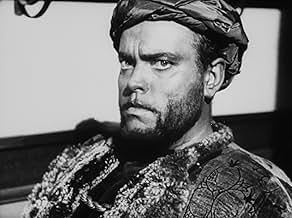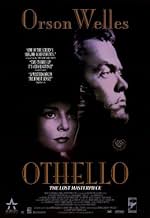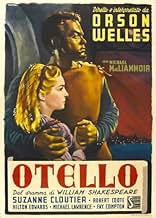IMDb-BEWERTUNG
7,5/10
9923
IHRE BEWERTUNG
Dem maurischen General Othello wird vorgegaukelt, dass seine neue Frau Desdemona eine Affäre mit seinem Leutnant Cassio hat, obwohl dies in Wirklichkeit alles Teil des Plans eines verbittert... Alles lesenDem maurischen General Othello wird vorgegaukelt, dass seine neue Frau Desdemona eine Affäre mit seinem Leutnant Cassio hat, obwohl dies in Wirklichkeit alles Teil des Plans eines verbitterten Fähnrichs namens Jago ist.Dem maurischen General Othello wird vorgegaukelt, dass seine neue Frau Desdemona eine Affäre mit seinem Leutnant Cassio hat, obwohl dies in Wirklichkeit alles Teil des Plans eines verbitterten Fähnrichs namens Jago ist.
- Regie
- Drehbuch
- Hauptbesetzung
- Auszeichnungen
- 1 Gewinn & 1 Nominierung insgesamt
Abdullah Ben Mohamet
- Pageboy
- (Nicht genannt)
Joseph Cotten
- Senator
- (Nicht genannt)
Jean Davis
- Montano
- (Nicht genannt)
Joan Fontaine
- Page
- (Nicht genannt)
Robert Rietty
- Lodovico
- (Synchronisation)
- (Nicht genannt)
Gudrun Ure
- Desdemona
- (Synchronisation)
- (Nicht genannt)
Empfohlene Bewertungen
I must be one of the few who saw this film (more than once!) before it vanished in the 60's. I saw it on TV in the last 50's, and later brought it to the small college where I was teaching 63-65. Though heavily cut and more than a little rearranged, it is one of the very finest of Shakespeare films. Performances are generally excellent and unified in style and diction. Welles, or course, is magnificent. Anyone who thinks he was never anything but a self-parodying ham has not seen this film. One could wish than MacLiammoir had had more overt FUN as Iago, who does what he does, in part at least, in an attempt to stimulate himself out of his blunted affect. The film also has some of the finest black-and-white cinematography of all time, and uses architecture in a unique and effective way.
Commenting on Shakespeare films is rather like admiring Easter Eggs.
First the inside: this was never a great play, relative to Shakespeare's other works. His great plays are about ideas, with characters as vectors to prod and activate them. This play is merely about characters, which makes it attractive to actors. That's certainly why Welles selected it.
Welles is the Sinatra of dramatic reading, with phrasing mastered in his radio days. All else is acceptable (at least to my tastes) so far as the play goes.
Now the shell, and here is what makes this film one of the most important. When Welles moved into film, he did so as an architect. He understood that great film constructs a space that includes the audience. So he worked with the most direct tools, buildings themselves. These sets are remarkable. I cannot imagine how he found them, how he could have seen the possibilities.
Selection aside, how he uses the spaces! View this film at least once in silence. I rate Welles as one of the 20th century's great architects and predict that this film will be mined when we get around to really creating cyberbuilding.
First the inside: this was never a great play, relative to Shakespeare's other works. His great plays are about ideas, with characters as vectors to prod and activate them. This play is merely about characters, which makes it attractive to actors. That's certainly why Welles selected it.
Welles is the Sinatra of dramatic reading, with phrasing mastered in his radio days. All else is acceptable (at least to my tastes) so far as the play goes.
Now the shell, and here is what makes this film one of the most important. When Welles moved into film, he did so as an architect. He understood that great film constructs a space that includes the audience. So he worked with the most direct tools, buildings themselves. These sets are remarkable. I cannot imagine how he found them, how he could have seen the possibilities.
Selection aside, how he uses the spaces! View this film at least once in silence. I rate Welles as one of the 20th century's great architects and predict that this film will be mined when we get around to really creating cyberbuilding.
I will not go into the film as many already have said how it is a great work of art despite its "troubled" filming history.
This film is now advertised and available as a "restored" dvd of a "lost" Welles film. But DO NOT be deceived. Whereas the 1998 cut of Touch of Evil was "restored" using a Welles memo as guidelines, Othello was restored by presuming many things. First, dialogue was put in sync and unintelligible diaglogue was "voiced over." And second, the original score was redone, but not exactly as the original. You could almost say a new score was used in the "restored" film. The original cut was Welles' 1952 European version which has only ever been availible as a (OOP) 1995 Criterion LaserDisc. As Welles' daughter owns the rights to Othello, that's the 1992 "restored" version which she also helped on, it is the only one currently availible for purchase in the US (as she receives no money for the 1995 CR laserdisc, she forced Criterion to stop making it.)
While many casual fans will not notice or care about the little changes, don't be deceived into thinking this is "Orson's intended version." Also DO NOT be deceived into thinking this is a lost film. It was only lost in the sense that it had no distribution until the early 90's.
This film is now advertised and available as a "restored" dvd of a "lost" Welles film. But DO NOT be deceived. Whereas the 1998 cut of Touch of Evil was "restored" using a Welles memo as guidelines, Othello was restored by presuming many things. First, dialogue was put in sync and unintelligible diaglogue was "voiced over." And second, the original score was redone, but not exactly as the original. You could almost say a new score was used in the "restored" film. The original cut was Welles' 1952 European version which has only ever been availible as a (OOP) 1995 Criterion LaserDisc. As Welles' daughter owns the rights to Othello, that's the 1992 "restored" version which she also helped on, it is the only one currently availible for purchase in the US (as she receives no money for the 1995 CR laserdisc, she forced Criterion to stop making it.)
While many casual fans will not notice or care about the little changes, don't be deceived into thinking this is "Orson's intended version." Also DO NOT be deceived into thinking this is a lost film. It was only lost in the sense that it had no distribution until the early 90's.
Orson Welles' short, low-budget, and in places fairly odd look at Shakespeare's play. It suffers from some stage-bound performances which don't quite work (Micheal MacLiammoir as Iago, Robert Coote as Rodrigo) plus an undefined Desdemona from Suzanne Cloutier.
However, this aside, Welles is marvellous as the Moor driven to jealousy and murder, his voice rolling through the meat of Othello's speeches, his bronze make-up creating a skin for the great general. For this performance alone the film is valuable. And it looks absolutely fantastic, springing off from its financial limitations and adding a new dimension to the often-told story.
However, this aside, Welles is marvellous as the Moor driven to jealousy and murder, his voice rolling through the meat of Othello's speeches, his bronze make-up creating a skin for the great general. For this performance alone the film is valuable. And it looks absolutely fantastic, springing off from its financial limitations and adding a new dimension to the often-told story.
I've always been an admirer of Welles movies, starting with citizen Kane and the other masterpieces. Considering Othello, I highly admired this movie since the first shot, when the face of the dead Othello appears suddenly in the dark, and then the other details begin to appear, revealing the awesome funeral of both Othello and his murdered wife. In fact the best thing about this movie is the synchronization of the camera movement and angles with the state of mind and moods of characters especially that of Othello. Sometimes we are actually looking at the world through Othello's mind, the images are bizarre and grotesque, this is accompanies by wonderful acting of the cast. For any Welles fan this is a must see, considering the beauty of picture and creativity of interpretation. It's a pity that Welles didn't have a sufficient financial support to surpass some technical problems although the final effect and meaning of this masterpiece is not affected at all!
Wusstest du schon
- WissenswertesWhen he made Die schwarze Rose (1950), Orson Welles insisted that the coat his character wore be lined with mink, even though the lining would never be visible in the finished film. The producers acquiesced to this demand. When the shoot was over, the coat disappeared. In "Othello", Orson Welles can be seen wearing the same coat, complete with mink lining.
- Alternative VersionenThis film by Orson Welles, was 'restored' by a group in Chicago in 1991/2. The film was transferred to, and enhanced in video, (D1 format) retaining it as black and white. The audio was completely rebuilt, including the score, in Stereo Surround. All dialogue, however was original. This was a problem as some of the dialogue was distorted and unintelligible. John Fogelson, editor, was a major supervisor of the project. Ed Golya, Lorita DeLacerna, and Steve Wilke, were digital editors. And Ed Golya remixed the soundtrack. The process took 9 months. It was purchased for distribution by Castle Hill, and taken to New York where it went through another transformation before release. The restoration engineer in New York, Paul Michael, restored the audio that was supplied on 35mm optical negatives. He was able to remove the distortion, optical pops and surface noise that is inherent with Optical negatives. The restored audio was then sent to Sound One for the final mix. Unintelligible dialogue was replaced with 'sound-alikes'. This decision was made for the entertainment value of the film. The original mono music was then reintroduced into the final product. Basically, the film was retransferred, and the rebuilt sound effects tracks were added. This was done at Sound One, in NYC.. The credits were adjusted to place Lee Dickter (sp?) as Re-recording Mixer, and Ed Golya as Sound Effects Editor.
- VerbindungenEdited into Geschichte(n) des Kinos: La monnaie de l'absolu (1999)
Top-Auswahl
Melde dich zum Bewerten an und greife auf die Watchlist für personalisierte Empfehlungen zu.
- How long is Othello?Powered by Alexa
Details
- Erscheinungsdatum
- Herkunftsländer
- Offizielle Standorte
- Sprachen
- Auch bekannt als
- Othello
- Drehorte
- Castle, El Jadida, Marokko(cistern interior)
- Produktionsfirmen
- Weitere beteiligte Unternehmen bei IMDbPro anzeigen
Box Office
- Bruttoertrag in den USA und Kanada
- 28.980 $
- Eröffnungswochenende in den USA und in Kanada
- 6.010 $
- 27. Apr. 2014
- Weltweiter Bruttoertrag
- 28.980 $
- Laufzeit1 Stunde 30 Minuten
- Farbe
- Seitenverhältnis
- 1.37 : 1
Zu dieser Seite beitragen
Bearbeitung vorschlagen oder fehlenden Inhalt hinzufügen

Oberste Lücke
By what name was Orson Welles' Othello (1951) officially released in India in English?
Antwort


































